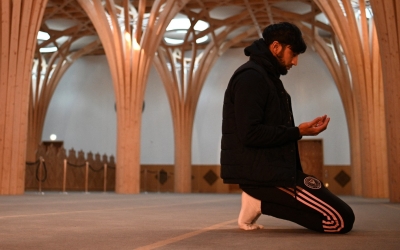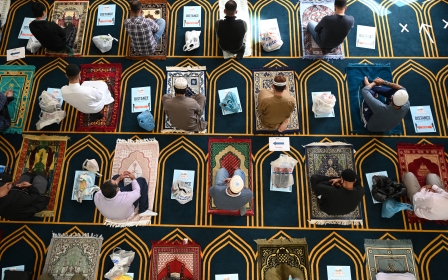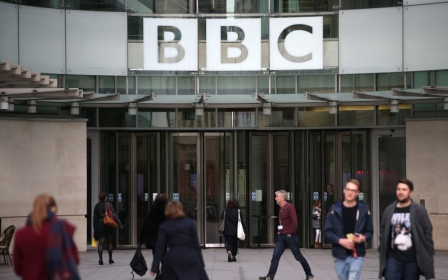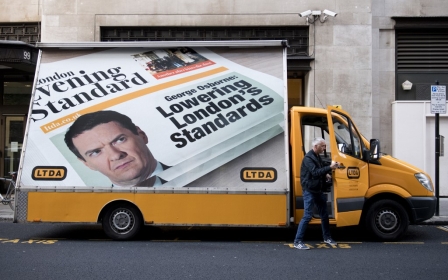UK, Islam and media: This is bullying, not journalism

Watching and reading news on Muslims and Islam is not always a pleasant experience. At least one-fifth of all articles on the topic pertain to terrorism and extremism. This was among a number of concerning facts and figures that I and others at the Centre for Media Monitoring found when we analysed more than a year’s worth of material from British newsrooms that referenced Muslims and/or Islam.
This included around 48,000 online news articles and 5,500 clips that aired between October 2018 and September 2019, giving us a clearer picture of how Muslims are reported on and where the problems lie.
Certain publications - the same ones that lambaste 'cancel culture' - often target individual Muslims or organisations
The right-leaning media, which includes most of the country’s heavyweight publications, fared worst across our rating metrics. Using a methodology designed alongside seasoned academics who have studied how Muslims are represented in the media, we pinpointed everything from the reproduction of tropes, to the misrepresentation of Muslim beliefs, to problematic headlines and imagery.
A disproportionate number of articles were biased on the subject of religion, with discussions around Islam mired in Orientalism. Islam was repeatedly framed as a hostile threat to the West, as right-wing pundits trotted out tropes with impunity, while Muslim characters in fictional dramas were shown as intolerant - and were often played by non-Muslim actors.
Around half of the news articles and clips we examined associated Muslims with negative aspects and behaviours. While this might not seem alarming given that news generally tends towards the negative, we did not discriminate between items that were predominantly about Muslims or those that contained only a passing mention, which is a cause for concern.
Platforming marginal figures
Our study was not just about identifying what was bad; we also found pieces that were fair and balanced, punching up against those in power, rather than punching down against Muslims, as is so often the case. Examples included the BBC’s John Sudworth reporting on the persecution of Uyghur Muslims in China, and the Spectator’s Stephen Daisley opining on the Birmingham schools affair, even as his publication was frequently rated poorly across our metrics.
I am often asked whether reporting on Muslims and Islam is getting better over time. But this is difficult to assess, as much depends on the news cycle and which subjects or events are in focus.
We have, however, seen a return in recent days by British tabloids to platforming marginal and unrepresentative figures as the face of British Muslims. In addition, certain publications - the same ones that lambaste “cancel culture” - often target individual Muslims or organisations, in an attempt to delegitimise and de-platform them.
Our report features close to a dozen instances in which individual Muslims were misrepresented in the media; in some cases, the victims spent years of their lives on a quest for justice and an apology. Some of the cases involved neoconservative organisations feeding information to newspapers who appeared happy to lap it up, targeting Muslims in the public space.
This is not journalism. It is bullying, and it impinges on the civil rights of British Muslims, ultimately aiming to silence them.
Willingness to change
Our report also looked at how words are used to delegitimise Muslims, such as by describing any Muslim organisation or individual in the public sphere as “Islamist” or practicing “Islamism”. Such terms have been used in a scattershot fashion, targeting everyone from Islamic State fighters, to democratically elected leaders, to schoolchildren who eat halal food at lunch.
Muslims cannot, and most do not, expect special treatment from the media. What they do expect is fairness
Producing a report as detailed as ours was an arduous task, and not always a pleasant one. But it was done in good faith, with the hope that it will inform and guide members of the media.
Better reporting on Muslims and Islam is not an impossible task, as shown by Daily Express editor Gary Jones, who in 2018 lamented that past front pages at the newspaper had contributed to an Islamophobic environment. He has worked to change that, setting an example for others.
Another encouraging sign came from the editors of the Daily Mirror and Sunday Times, who welcomed our report, even though it criticised some of their coverage. This suggests that there is a willingness at the highest levels to produce better journalism - and we welcome that.
Muslims cannot, and most do not, expect special treatment from the media. What they do expect is fairness and to be treated no differently than any other community. As the former chair of the Independent Press Standards Organisation pointed out a couple of years ago, Muslims have been treated differently by British newspapers. Our findings would agree with him, and it’s up to news editors and journalists to change that.
The views expressed in this article belong to the author and do not necessarily reflect the editorial policy of Middle East Eye.
Middle East Eye propose une couverture et une analyse indépendantes et incomparables du Moyen-Orient, de l’Afrique du Nord et d’autres régions du monde. Pour en savoir plus sur la reprise de ce contenu et les frais qui s’appliquent, veuillez remplir ce formulaire [en anglais]. Pour en savoir plus sur MEE, cliquez ici [en anglais].






